Sanitation WorkersBlog

Shotaro Goto Relatively good working conditions alongside persistent stigma: the story of formal pit emptying workers in Lusaka, Zambia January 2026
In Lusaka, Zambia, pit emptying is an essential yet often overlooked service that helps keep on-site sanitation systems properly functioning. This story focuses on pit emptying workers employed by seven formally registered companies and draws on fieldwork conducted by the author in Chawama, a peri-urban area of Lusaka. Read more …

Man Bahadur Pode A Life Beneath the City: My 45 Years in Sanitation Work January 2026
My name is Man Bahadur Pode. I am 55 years old, and sanitation work has been my life for nearly 45 years. I began this work when I was just 10 years old. Back then, people in Kathmandu believed that small children were best suited for entering septic tanks because we could fit into narrow spaces. Read more …

Abubaker Semukoteka and Sterenn Philippe From subjects to collaborators: centering sanitation workers in research December 2025
In 2023, ISW launched the second phase of its Research Support Grants with a bold shift: positioning sanitation workers not as subjects of study, but as central actors in the research process. Among the grantees, the Brilliant Sanitation Limited (BSL) partnered with the Urban Action Lab (UAL), Makerere University, to investigate an important question: “What are the intended and unintended consequences of sanitation workers’ formalization and visibility enrichment in Kampala city?” To reflect on this inclusive research approach, we spoke with Abubaker Semukoteka—representative of the Association’s manual emptiers, and CEO and founder of Brilliant Sanitation Uganda Limited, a pioneering pit-emptying and fecal sludge transportation service in Kampala. Read more …

Sanitation Workers Research Awards 2025- Meet the awardees October 2025
Meet the outstanding recipients of the 2025 Sanitation Workers Research Awards — whose work sheds light on the challenges faced by sanitation workers and seeks pathways to dignity and justice. These awards, born of a collaboration between the Initiative for Sanitation Workers and the Water and Health Institute at UNC, embody a shared commitment to transformative research with real-world impact. Read more …

Chisala D. Meki and Patricia Mubita Pit Emptiers in Zambia: A Look at the Unseen Heroes of Sanitation July 2025
They protect public health, yet work in the shadows. With little safety gear, minimal healthcare, and daily exposure to life-threatening hazards, Zambia’s pit emptiers face unimaginable challenges—both physical and social. Based on a study of 196 sanitation workers across 10 provinces, this blog uncovers the dangerous conditions, systemic neglect, and silent resilience of the people who keep our communities clean. Who are these unseen heroes—and what will it take to ensure their dignity and safety? Read on to find out... Read more …
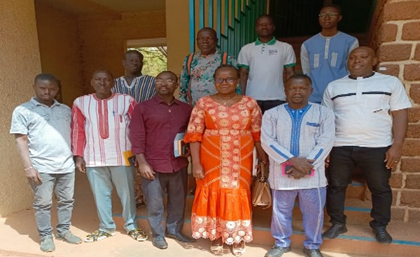
Alidou Bande et Sterenn Philippe Le plaidoyer porte ses fruits : la reconnaissance officielle des vidangeurs manuels ouvre de nouvelles opportunités July 2025
Après des années de plaidoyer menées par l’Association des Vidangeurs Manuels du Burkina Faso (ABASE), le gouvernement a officiellement reconnu, en 2023, le métier de vidangeur manuel — ouvrant ainsi la voie à la délivrance d’autorisation municipales et au tout premier programme de formation professionnelle officiellement certifié par l’État pour les vidangeurs manuels en Afrique. Le lancement de ce programme de formation est prévu d’ici la fin de l’année. Read more …

Alidou Bande and Sterenn Philippe Advocacy Pays Off: Official Recognition of Manual Emptiers Unlocks New Opportunities July 2025
Following years of advocacy by the Association of Manual Emptiers of Burkina Faso (ABASE), the government officially recognised manual emptying as a profession in 2023, opening the door to municipal licensing and to Africa’s first formal vocational training program for manual emptiers, set to launch at the end of this year. Read more …
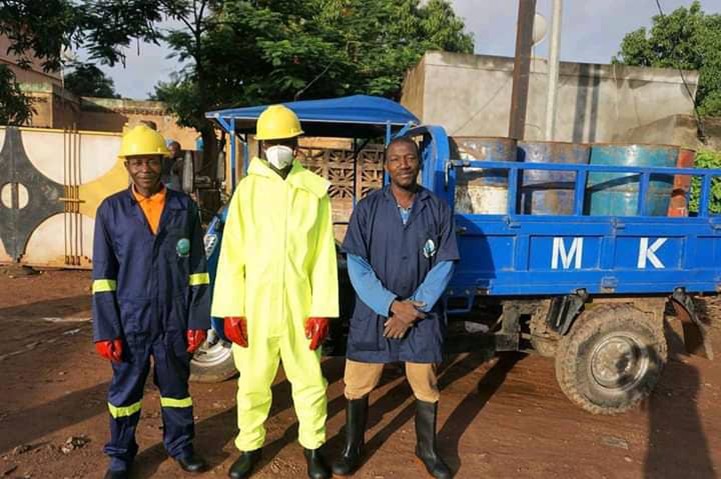
Alidou Bande et Sterenn Philippe Petit investissement, grand impact : comment les vidangeurs au Burkina Faso ont transformé une petite subvention en un changement durable. June 2025
Je m’appelle Alidou Bande, je suis vidangeur manuel au Burkina Faso et président de l’Association des Vidangeurs Manuels du Burkina Faso (ABASE). Read more …

Alidou Bande and Sterenn Philippe Small change, big change: How Burkina Faso’s sanitation workers turned a small grant into lasting change. June 2025
My name is Alidou Bande, and I am a manual emptier in Burkina Faso and the President of the Association of Manual Emptiers of Burkina Faso (ABASE). Read more …
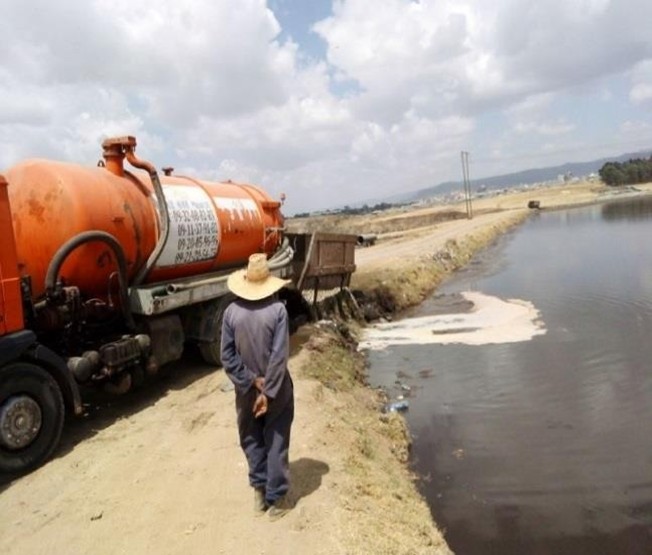
Amensisa Hailu Tesfaye, Gebisa Guyasa Kabito, Kassahun Alemu Gelaye, Dagnachew Eyachew, Awrajaw Dessie, Nardos Hussein, Giziew Abere and Tesfaye Hambisa Mekonnen Protect Those Who Protect Us: The Hidden Frontline of Sanitation Workers in Ethiopia May 2025
Every day, sanitation workers across Ethiopia put their health and dignity at risk to maintain clean and safe environments. They represent the invisible frontline and the hidden backbone of the public health system... Read more …
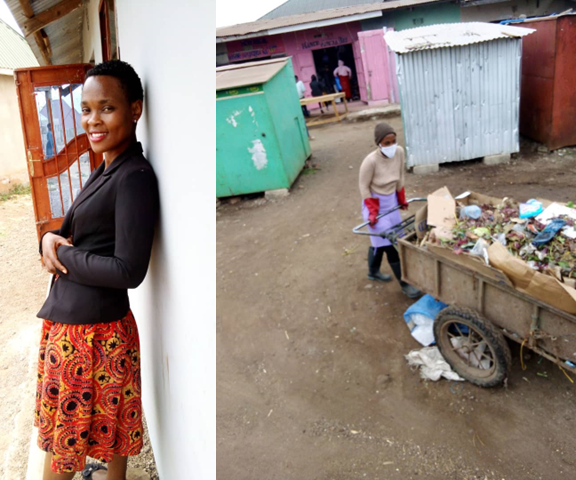
Dr. Richard Kimwaga, Dr. Tim Ndezi, and Hezron Magambo, Breaking Barriers: Lightness’ Journey as a Female Sanitation Worker in Arusha May 2025
In Arusha, Tanzania, where sanitation work is dominated by men, one woman is rewriting the rules. From sweeping streets to mastering the tough, technical work of manual pit emptying, Lightness Loi has broken through gender norms to become a voice for equity, safety, and dignity in sanitation. Despite ill-fitting PPE and social stigma, her resilience and the support of the Arusha Depot Group have propelled her to the frontlines of change. Read more …
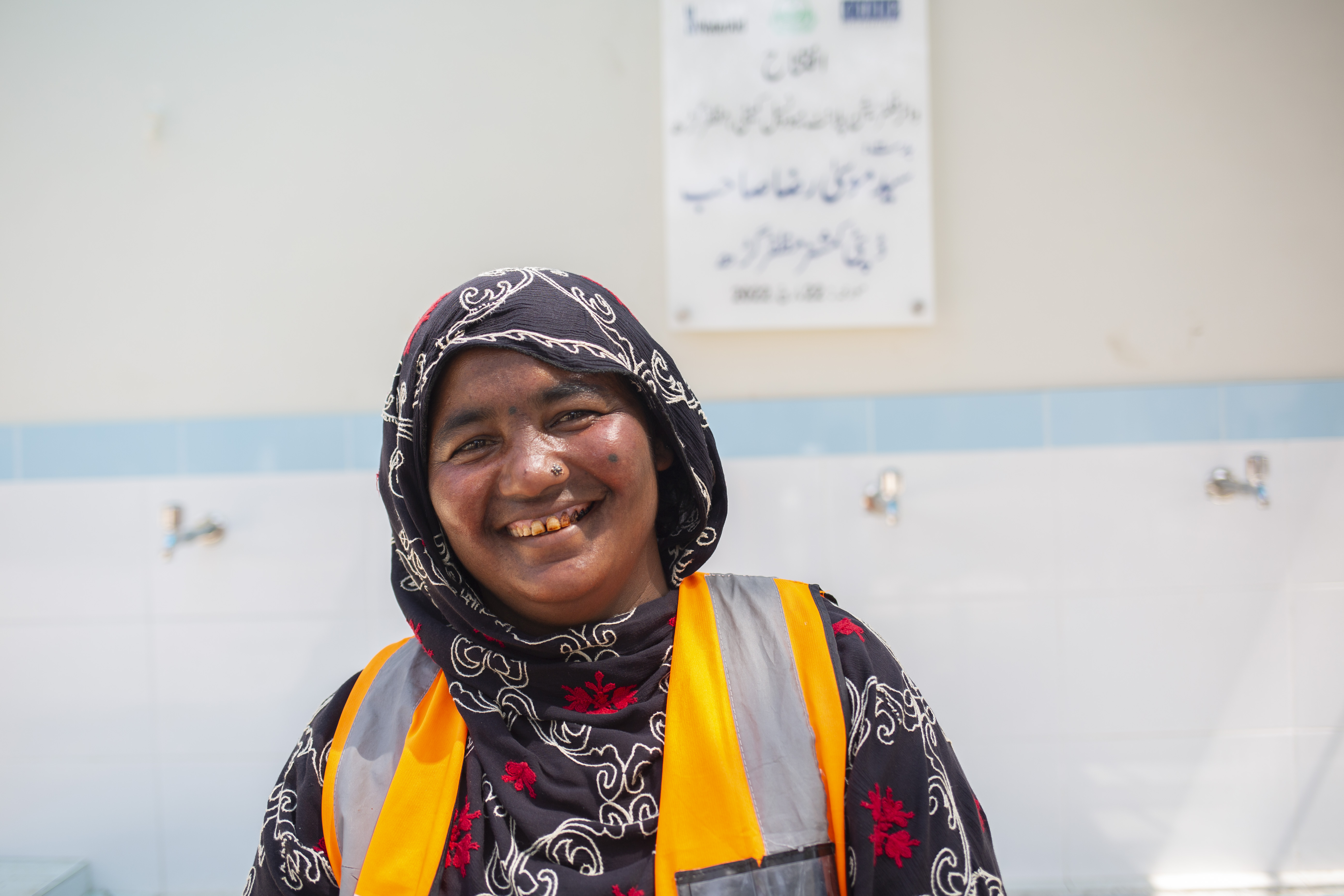
Sanitation Workers Research Awards 2025- Applications open till 2nd May 2025 March 2025
The Water Institute at UNC and the Initiative for Sanitation Workers are pleased to invite submissions for the fifth edition of the Sanitation Workers Research Awards, to be presented at the 2025 UNC Water and Health Conference. Read more …
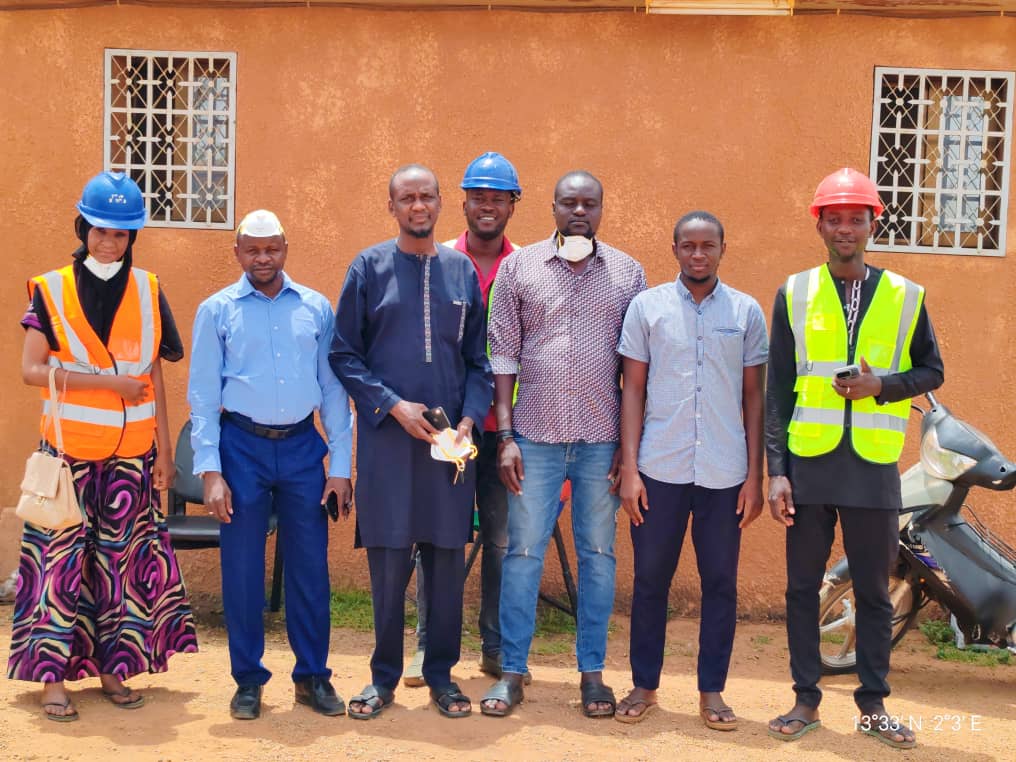
Sterenn Philippe, Consultant, WaterAid/ISW Association de vidangeurs et chercheurs unissent leurs forces au Niger | A sanitation worker association and research team join forces in Niger March 2025
La recherche ne se limite pas à la connaissance—elle a pour but de créer un impact. Au Niger, des chercheurs et des travailleurs de l’assainissement unissent leurs forces pour traduire les données en actions concrètes, améliorant ainsi leurs conditions de travail et leur reconnaissance. Découvrez comment la recherche a un impact immédiat pour ceux qui sont en première ligne de l’assainissement. ************** Research isn't just about knowledge—it’s about making a difference. In Niger, researchers and sanitation workers are joining forces to turn data into action, improving working conditions and securing well-deserved recognition. Discover how research is making an immediate difference for those on the front lines of sanitation. Read more …
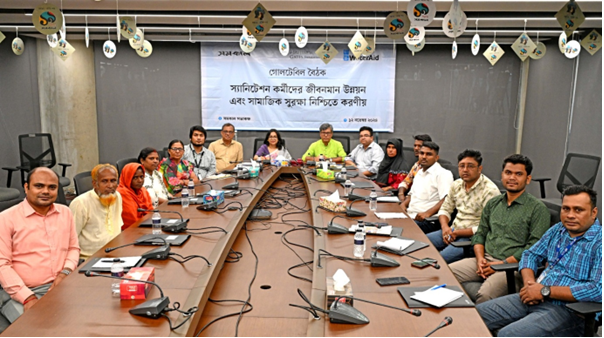
Sterenn Philippe and Tahmidul Islam Securing Rights for Sanitation Workers: The Case for Formalization in Bangladesh March 2025
Did you know that despite Bangladesh's National Social Security Strategy, thousands of sanitation workers remain excluded from essential benefits like pensions, health insurance, and maternity leave? These workers, often trapped in informal and exploitative employment arrangements, struggle daily without job security or social protection. WaterAid Bangladesh’s latest insights, based on conversations with 144 sanitation workers and key government officials, uncover the harsh realities of ghost employment, the lack of formal recognition, and the urgent need for policy reforms. Read more …

Michael Poustie, Tanvir Ahmed, Mariam Zaqout and Dani Barrington The unintended consequences of formalising municipal, faecal sludge emptying services in Bangladesh December 2024
Formalizing faecal sludge management in Bangladesh is a critical step toward achieving SDG 6.2, with promises of safer working conditions, better wages, and dignity for sanitation workers. However, is the reality living up to this promise? While some workers have benefited from mechanical desludging and support from NGOs, many others face reduced incomes, job displacement, and inequitable access to resources. This blog delves into the unintended consequences of these reforms and explores how a "do-no-harm" approach is essential to ensuring these initiatives truly empower sanitation workers without exacerbating their vulnerabilities. Read more …

Mike Poustie, Kashfia Mawa, Mir Tanvir Al Biruni and Tanvir Ahmed A work in progress: some things change, but some things stay the same! December 2024
“We have participated in so many meetings and training sessions… but this time you are trusting us with these devices and inviting us to show you our lives…. we have never done anything like this before.” There was a sense of eagerness in the room, as this local sanitation worker shared his reflections following the initial training session on ‘Photovoice’. Read more …

Story of a sanitation worker from Nepal My name is Tika Lal. I am a sanitation worker. November 2024
Tika Lal, a sanitation worker from Nepal, has spent 17 years managing faecal sludge, facing hazardous conditions, societal stigma, and irregular pay. Despite these challenges, he continues his vital work with resilience and hope. Empowered by training from FANSA and support from organizations like WaterAid, Tika Lal advocates for dignity, safety, and better working conditions. From unsafe septic tanks to the lack of hygiene facilities, his story highlights the urgent need for systemic change. Explore Tika Lal’s journey and join the call to respect and support sanitation workers, the hidden heroes of our communities. Read more …

Kanika Singh and Andrés Hueso González Empowering sanitation workers: Lessons from a pilot support fund November 2024
Strategic investments in localized, flexible funding can transform sanitation workers into advocates for their own rights, strengthening their capacity to engage with policymakers and improve sanitation service delivery. The Initiative for Sanitation Workers (ISW) pilot Empowerment Support Fund highlights how decolonized funding approaches—like autonomy, trust-based partnerships, and adaptable support—have empowered sanitation worker groups across six countries in Africa and South Asia. By facilitating self-advocacy and skill-building, this model not only advances workers' rights but also enhances sanitation outcomes, illustrating the impact of meaningful support for marginalized workers. Read more …

Maran Thangavel, Harsha Joseph, Saran Kumar, Govindaraj Raaju V. and Kanika Singh Bridging the gap: Social protection and livelihoods support for Tamil Nadu sanitation workers November 2024
In the heart of Tamil Nadu, sanitation workers like Poongiammal have endured harsh working conditions and societal discrimination for decades. Despite policies in place, these workers often lack access to essential services, fair wages, and safe environments. Through the dedicated efforts of Vizhuthugal, an NGO advocating for sanitation workers’ rights, change is taking root. From helping workers claim compensation to enabling pathways to new livelihoods, Vizhuthugal is breaking the cycle of poverty and stigma. Dive into their journey of resilience and empowerment in this eye-opening story. Read more …

Mary James Gill and Kanika Singh The Sweepers’ Association Pakistan: a collective voice for the rights and dignity of sewer cleaners October 2024
In a society that often overlooks their sacrifices, Pakistan’s sanitation workers face daily hazards without recognition or protection. This blog delves into the grassroots movement led by the Center for Law & Justice (CLJ), showcasing their resilient fight for dignity, safety, and rights. From tragic incidents sparking change to the establishment of the Sweepers’ Association Pakistan through community mobilization and advocacy, this story highlights the efforts of these unsung heroes and the CLJ's mission to uplift them. Discover the heartwarming transformations, empowering workshops, and the unified voices striving to break taboos and push for systemic change. Read more …

K. B. Obalesh and Kanika Singh Catalysts for Change: Sanitation Workers’ Grassroots Network in Karnataka October 2024
In Karnataka, the NGO Thamate is transforming sanitation workers from being mere advocates to becoming empowered leaders. Through the Safaikaramchari Kavalu Samiti (SKKS), a community-based network, sanitation workers have been mobilizing for their rights, demanding accountability from local authorities, and ensuring their voices are heard. This blog highlights how these sanitation workers are not only breaking down barriers but also paving the way for systemic change across the state with Thamate's support. Read more …

Zakir Hossain and Kanika Singh From the margins to centre stage: supporting caste-oppressed sanitation workers in Bangladesh October 2024
Nagorik Uddyog is bringing the voices of Bangladesh's Dalit sanitation workers to the forefront. Facing life-threatening conditions and deep-rooted caste discrimination, these workers are standing up for their rights. From human chains to national advocacy, Nagorik Uddyog is leading a movement to demand safety, fair wages, and dignity. Learn how they are pushing for change. Read more …

Mussa Bushele, Leyla Khalifa and Kanika Singh From informal manual emptiers to emerging role models: the journey of Tanzania’s Watu Kazi group September 2024
In Tanzania, the Watu Kazi group has turned dangerous, informal sanitation work into a model of safety and advocacy. With support from SNV and local government, they’ve gained recognition, improved working conditions, and are inspiring change across the region. Read more …

Sanitation Workers Research Awards 2024- Meet the awardees September 2024
Introducing the distinguished recipients of the 2024 Sanitation Workers Research Awards! These awards, a partnership between the Initiative for Sanitation Workers and the esteemed Water and Health Institute at the UNC, hold a profound purpose: to ignite transformative research on the challenges and rights of sanitation workers. Read more …

Adnan Hakeem and Sterenn Philippe An Urgent Call to Protect Sanitation Workers' Health and Safety November 2024
In Pakistan, sanitation workers, like 50-year-old Tasleem Mai from Muzaffargarh, reveal a side of public health that few ever see: toxic fumes, makeshift safety practices, and the relentless physical toll of dangerous work. This blog shares their unfiltered stories—from Adnan Zaib’s painful recovery after a severe injury to the desperate need for better equipment and health support across cities like Karachi and Peshawar. It’s a raw look at the lives behind the labor, and what it would take to turn promises of safety into reality. Take a moment to hear their voices and join the call for change. Read more …

Taibat Lawanson, Basirat Oyalowo and Anthony Akpan Institutional support for precarious livelihoods in the Lagos urban sanitation sector August 2024
The second blog in the series draws from the 'Hidden World of Lagos Sanitation Workers' report to shed light on the institutional challenges faced by sanitation workers in Lagos. Despite their vital role in urban hygiene, these workers experience precarious working conditions and lack sufficient institutional support. The blog emphasizes the need for stronger frameworks, better protection, and recognition of their contributions. It also discusses efforts to organize workers, improve their livelihoods, and integrate them into formal support systems, highlighting the importance of addressing these issues to achieve SDG 6 (Sanitation for All) and SDG 8 (Decent Work and Economic Growth). Read more …

Basirat Oyalowo, Taibat Lawanson and Anthony Akpan The reality of urban sanitation workers in Lagos, Nigeria August 2024
Sanitation workers in Lagos, Nigeria, are vital yet often overlooked contributors to urban health. This first blog in a two-part series by Basirat Oyalowo, Taibat Lawanson, and Anthony Akpan delves into their essential roles, the stigma they endure, and the harsh conditions they face. Through the 'Hidden World of Lagos Sanitation Workers’, discover how recognizing and supporting these unsung heroes can transform urban waste management and improve city-wide hygiene. Stay tuned for the next part, where the research team highlights the crucial institutional support needed to secure and uplift the precarious livelihoods of Lagos's sanitation workers! Read more …

M M Mamshad and Laura Kohler Shasthya Nirapotta Scheme: a financial safety net for sanitation workers in Bangladesh July 2024
Sanitation workers play an essential public health role, but struggle to access social protection and insurance. To change this, WaterAid Bangladesh and Waada.Insure launched the Shasthya Nirapotta Scheme – an insurance scheme that offers sanitation workers and their families health protection and financial security at an affordable cost. Read more …


Bruce Rutayisire, Jonathan Wilcox Developing formal pit-latrine emptying businesses for hard-to-serve customers: resources, methods, and pricing structures May 2024
This study compares pit-latrine emptying businesses in Kampala, Uganda, and Kigali, Rwanda, focusing on resources, methods, and tariffs. Empirical data from Forever Sanitation and Pit Vidura show challenges with portable vacuum pumps in hard-to-reach areas, highlighting the need for formal manual emptying for some customers where mechanical methods are not viable. Manual emptying has similar duration to using a portable pump because of the additional time to set up, pack, and clean equipment. Higher regulatory standards can exclude households from using formal services. The study highlights the role of government in managing the tensions between affordability, formalization, and increasing coverage. Read more …

Mike Poustie, Uttam Saha, Jinnaton Nessa A model to improve the dignity and livelihoods of sanitation workers May 2024
Part of the blog series 'Researchers for Sanitation Workers’ Rights' by UNC Sanitation Workers Research Awards 2023 awardees Read more …

Tonny Ssekamatte Trials and tribulations of desludging operators in Uganda April 2024
Part of the blog series 'Researchers for Sanitation Workers’ Rights' by UNC Sanitation Workers Research Awards 2023 awardees Read more …

Sylivanus Obiero Occupational exposure to sewer gases among informal sanitation workers in Nairobi, Kenya April 2024
In Nairobi, Kenya, informal sewer workers face significant health risks due to exposure to hazardous gases like hydrogen sulphide (H2S) and carbon dioxide (CO2). A study conducted by Kenyatta University's Department of Environmental and Occupational Health (DEOH) revealed elevated gas levels in sewer facilities, posing short- and long-term health threats. Read more …

Leyla Khalifa Sanya’s vision: formalising more manual emptier groups March 2024
"We considered them – manual emptiers – our enemies of sorts and the relationship we had with them was of a police-fugitive type", recounted Sanya Anthony Mwara, the Municipal Health Officer at Shinyanga Municipal Council. No longer outcasts, more and more emptiers have become sanitation heroes and partners for change. In this blog, Sanya shares what made this possible. Read more …

Bulafu Douglas Personal Protective Equipment for Sanitation Workers at Fecal Sludge Management Plants in Uganda March 2024
Part of the blog series 'Researchers for Sanitation Workers’ Rights' by UNC Sanitation Workers Research Awards 2023 awardees Read more …

October 2023 Sanitation Workers Research Awards 2023- Meet the awardees October 2023
Introducing the distinguished recipients of the 2023 Sanitation Workers Research Awards! These awards, a partnership between the Initiative for Sanitation Workers and the esteemed Water and Health Institute at the UNC, hold a profound purpose: to ignite transformative research on the challenges and rights of sanitation workers. Read more …

Appel à propositions - Subventions de soutien à la recherche pour les agents de l'assainissement 2023-2024; Date limite : 24 juillet 2023 Call for proposals- Sanitation Workers 2023-2024 Research Support Grants; Deadline: 24 July 2023 June 2023
The Initiative for Sanitation Workers (ISW), a global advocacy partnership between ILO, WHO, World Bank, WaterAid and SNV, is pleased to announce this call for proposals, as part of the 2023-2024 Sanitation Workers Research Support Grants, which aims to connect researchers with sanitation worker organizations to collaborate in addressing the knowledge gaps and practical challenges of protecting sanitation workers’ rights. ***** L'Initiative pour les travailleurs de l'assainissement (ISW), un partenariat mondial de plaidoyer entre l'OIT, l'OMS, la Banque mondiale, WaterAid et SNV, a le plaisir d'annoncer cet appel à propositions, qui fait partie des subventions de soutien à la recherche sur les travailleurs de l'assainissement 2023-2024, qui vise à mettre en relation les chercheurs avec les organisations de travailleurs de l'assainissement afin de collaborer pour combler les lacunes en matière de connaissances et relever les défis pratiques liés à la protection des droits des travailleurs de l'assainissement. Read more …

Story of a sewer worker from Pakistan My name is Shafique Massih, I am a sanitation worker. October 2023
By Shafique Massih, edited by Sterenn Philippe Read more …

Sanitation Workers Research Awards 2022- Meet the awardees October 2022
Meet the awardees of the 2022 Sanitation Workers Research Awards. These awards, a collaboration between the Initiative for Sanitation Workers, and the Water and Health Institute at the UNC, aim to encourage research on sanitation workers' challenges and rights. Read more …

Sanitation Workers Research Awards 2022- Join us for the announcement October 2022
To encourage research on sanitation workers' challenges and rights, the Initiative for Sanitation Workers, and the Water and Health Institute at the UNC are supporting the annual Sanitation Workers Research Awards, which are announced at the UNC Water and Health Conference every year. The 2022 awards will be announced during the 26 October plenary session at 10.30 AM EDT. Read more …

Jen Barr, PhD, MPH Sanitation workers’ health: a global perspective August 2022
A team from Emory University and the World Health Organization published a literature review examining health outcomes of sanitation workers in the 2022 International Journal of Hygiene and Environmental Health. Given the working conditions and the potential exposures to hazardous materials, understanding the exact risks that sanitation workers are exposed to is vital in improving their wellbeing. While most parts of this field need significantly more study, the three populations identified by the literature review that need the greatest amount of work yet are women, informally employed workers, and workers in low-income nations. Read more …

Sally Cawood, Amita Bhakta Man or machine? Eliminating manual scavenging in India and Bangladesh March 2021
Can mechanisation address the problem of manual scavenging? The article looks at the historical, social, political and economic context of manual scavenging in South Asia; and highlights how mechanisation can end up reinforcing gendered, classed and casteist inequalities in sanitation work. Read more …

Sally Cawood, Malisha Farzana, Faisal Naeem and Hossain I. Adib Are minorities losing out on improved sanitation work? Calls to action for Bangladesh February 2021
Drawing on a study undertaken with WaterAid in February–March 2020, Sally Cawood, Malisha Farzana, Faisal Naeem and Hossain I. Adib reflect on the challenges facing manual pit latrine emptiers, and key actions to foster improved job opportunities for marginalised sanitation workers in Bangladesh. Read more …

Maggie Forte 5 Hidden Dangers Sanitation Workers Face February 2022
COVID-19 has deemed sanitation workers essential workers in fighting the pandemic which has granted them a larger appreciation for their work. Sanitation work is a profession that can impact poverty by keeping communities clean. It also perpetuates it by putting the workers at risk for health concerns, conditions and unsustainable pay among five other hidden dangers that sanitary workers face. Read more …

World Bank Sanitation Workers: Light at the End of the Tunnel? October 2019
Sanitation workers often face extreme health hazards and safety risks on the job. In many developing countries, they are informal workers with no legal protections or rights. With a lack of visibility in society, they can be stigmatized, marginalized and ignored. The feature story by World Bank presents an overview of the challenges faced by sanitation workers. Read more …

Mariam Zaqout (PhD Candidate, University of Leeds) Are we supporting or suppressing sanitation workers? April 2022
Mariam Zaqout discusses the appropriateness and effectiveness challenges of providing assistance to improve the livelihoods of sanitation workers in low and middle-income countries. Read more …

Vanessa Guenther, Karen Setty, and Rachel Peletz Five Ways to Enhance Safe Fecal Sludge Management in Urban, Low-income Areas February 2022
Densely populated areas unserved by sewer systems continuously produce fecal sludge, for which safe disposal or recycling is challenging to achieve at scale. A group of researchers from the Aquaya Institute, Oliver Wyman, and Great Lakes University of Kisumu collected evidence and recommendations from Kisumu, Kenya. Read more …


